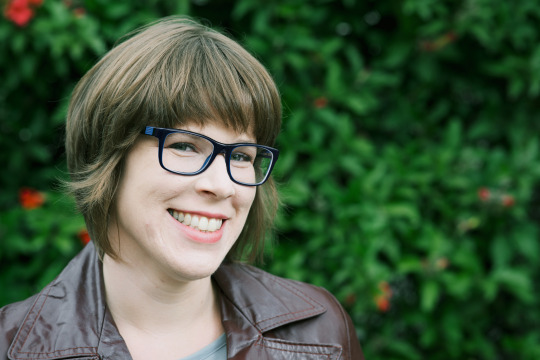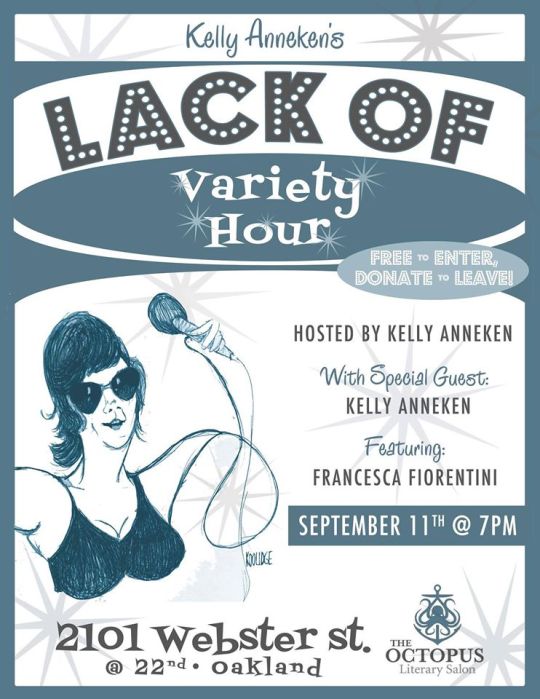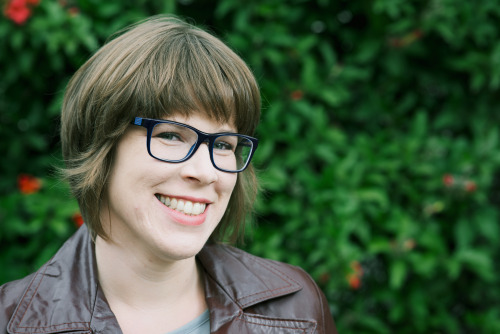
Wildly talented Kelly Anneken is a one-person army of charisma. Most interviews, in person or via correspondence, ALWAYS requires a little teasing out, a little leaning, a few follow ups. Not so much with Kelly, the loquacious proprietor of Femikaze, Hobo Pancakes, Up Yours, Downstairs and a litany of laudable comedic achievements. She took all my questions, hit the nail on the head, and drove the hammer through the fucking wall.
Since last September, the comedian has been writing, performing, producing, curating and presenting the eponymously named “Kelly Anneken’s Lack of Variety Hour” at the Octopus Literary Salon in Oakland. The results have been magical. Succinct and breakneck movie adaptations sandwiched between a grip of vernix-covered new material, and sing-a-longs. Deeply rich personal stories rife with thematic catharsis, clever slide-show multimedia presentations, a handpicked (and super-talented) special guest stand-up comedian, audience and performers 100% committed to the process. The Lack of Variety Hour is intimate kitsch, a playground of Kelly’s will, wile and whimsy, and its continued and impressive success is a testament of the artists’ personhood and magnitude.
Enjoy this interview en route to the next Lack of Variety Hour, happening this Friday, February 12th @ Octopus Literary Salon (7pm, Free (but Donations Encouraged)).
Courting Comedy: What have all the themes been in your show so far?
Kelly Anneken: So far we’ve done “Politics/Money,” “Weddings,” “Drinking/Drugs,” and “Retail/Work.” The next show is “Pop Culture.”
Courting Comedy: How much time does it take you to write your show? Is there a system or process?
Kelly Anneken: It varies, and despite my best intentions, I tend to wind up scrambling to finish everything the night before. The standup segments are generally already written in one form or another because I just take the Google Doc I have for a particular theme and arrange the jokes I think have legs in a way that makes some kind of sense. Those GDocs are the culmination of about 4 or 5 years’ worth of writing, so there’s no shortage of raw material. There’s more editing than straight writing, and that goes for the 4 Minute Movies as well, because I watch each movie and write down phrases that strike me as potentially funny or that get at the essence of the movie, so hopefully people who aren’t familiar with it can connect and get something out of the segment. The only jokes I generate for the show are the Cable Movie Descriptions, Nail Polish Names, and Fame Swap since those tend to be topical and short–the kind of thing I can write in an hour or two.
Then there’s the songs–my accompanist, Michelle Alexander, takes whatever bonkers pop songs I want to sing and arranges them for piano and we get together to rehearse about twice in the month leading up to each performance. The great thing about working with Michelle is that we kind of reverse engineer that stuff and we rarely use sheet music. It reminds me of seeing the White Stripes live–Jack White used to lead Meg’s drumming, when generally speaking, the drummer should be the one setting the tempo and the rhythm. So I’ll occasionally pick a weird key and Michelle just rolls with it. We’re like Thelma and Louise if instead of driving into the Grand Canyon, we’d just changed our identities and toured piano bars. Which actually might just make us Jerry & Jerry Sizzler from Kids In the Hall, now that I think about it.
I think I’m slowly establishing a “process” in that each time I do the show, it doesn’t feel quite as difficult as the time before.
Courting Comedy: Was there anything you felt you couldn’t do or were discouraged from doing in a traditional stand up show that Lack of Variety Hour affords?
Kelly Anneken: The way that generating new standup works, in general, is that you build your set incrementally by doing 3 minute sets at open mics. And even though I have learned to work that way as well, my preference is to start with a huge amount of material and then trim it down–20 or 30 minutes is usually ideal. So it’s like the difference between making a sculpture out of found materials versus chiseling a sculpture out of a single piece of marble. There’s absolutely nothing better or worse about either approach, it’s just much harder to get the kind of stage time you need to work stuff out when you’re starting with a macro approach.
Oh, also, most standup venues don’t have a piano, so that’s pretty jacked up.
Courting Comedy: What are the dumbest inferred or enforced rules of stand-up (or comedy in general)?
Kelly Anneken: I hate the idea that “all stage time is good stage time.” I think that’s helpful very early on when you’re trying to establish yourself in a new scene, meet people, and just kind of sort out how to be funny, but at a certain point you’re not getting anything out of barking jokes out into the void of a poorly attended show. Part of creating Lack of Variety hour was giving myself the opportunity to try out new jokes in front of an actual audience. It’s so crazy to say, but I think in all the writing and discussion of comedy, it’s easy to get wrapped up in the idea of seeking approval from your peers and from the industry and lose sight of the fundamental point of the job, which is to entertain an audience.
I also hate that audiences are biased against women comics. That’s a sweeping generalization, but I recently attended a show where there was only one woman on the bill and you could just feel the energy shift as she took the stage, even after the host gave her a great introduction. It’s so odd to me–people show up ready to laugh at men in a way they aren’t ready to laugh at women. There’s this additional bar to clear, still. I wish all the journalists who ask women comics if women are funny (which is like asking a doctor if he actually knows how to use his stethoscope) would start talking to audiences about that instead. Audiences don’t trust women to be good at this job, and their ignorance feeds into the bias we see in how individual lineups and festivals are booked. It’s the reason comedy scholars can write books about the craft of joke-writing and barely make an effort to even include interviews with token women. There’s so much talk on the supply side, the industry side about gender discrimination, but efforts to change that can only go so far if the audience, which is the source of all the revenue in comedy, is willing to enthusiastically come along for the ride.

Courting Comedy: If you close your eyes, where and what venue do you imagine taking Lack of Variety Hour to? What is your ideal outfit?
Kelly Anneken: Honestly, just a series of weird little black box theatres with very well-stocked front of house bars. I’m trying to figure out what a tour would look like, and what combo of comedy and Fringe festivals to apply to, and also whether I can kidnap Michelle for long enough to make that happen–she is very integral to the show’s feel and aesthetic, and it would be tough to find locals who can do what she can do on tour stops. Locally, I’d say Doc’s Lab or the bar at Pianofight are also good fits–they’re kind of low-key chic and about the right number of seats for weird cabaret stuff. I really like The Octopus Literary Salon, so I want to keep the workshoppy bits there as long as we can accommodate the audience in that space–it’s very intimate and I like that.
My ideal outfit is one that someone else has chosen that makes me look really good, maybe with like sparkles or some kind of cool stitching, and that fits in the boob area. It’s a struggle for even very famous women who are busticularly blessed to get a dress that fits (Christina Hendricks, Rachel Bloom), so it’s my goal in life to hire a full-time boob wrangler. I enjoy looking nice, but I kind of don’t trust my own aesthetic sense, so I need to outsource asap. Oh, and also I’d like to have someone do my eye makeup, because I don’t have a lot of aptitude there.
Courting Comedy: What LoVH segment/piece/bit are you most proud of? Are there any that you’ve added to or tweaked that you’d like to try to workshop again?
Kelly Anneken: I am really proud of the 4 Minute Movies. If I had to point to one thing that really propelled this thing forward creatively, it’s that segment. It’s not that you can’t do that in regular standup, but when you’re at the level I’m at where at best you get like 20 minutes to do your thing, 4 minutes is a lot of real estate to park on top of with what is essentially a monologue with very few laugh breaks. But I came up with the idea because I run around my apartment a lot doing my impression of Sara Goldfarb from Requiem for a Dream, and it’s so fun that I want to share it with people. I’d like to just be better about memorizing the pieces and improving the physicality around the performance–I think I need to mug more and draw certain things out so people are comfortable laughing. Audiences are disproportionately impressed with what I do with the 4MM, which feels good, but I’m always looking to improve and make them funnier and more accessible instead of this kind of weird memorization/endurance test.
Courting Comedy: Is there anything in the upcoming show that would be a fun teaser for people to come out for?
Kelly Anneken: The 4 Minute Movie is “Ever After,” which is a movie that I own and yet still watch every single time it is on tv. I love it. I love it SO MUCH, and that’s the case for a lot of women my age, because it came out in the late nineties and dared to ask the question, “What if Cinderella was, like, feminist, and also Drew Barrymore?” I was a little too young and Republican for Lillith Fair, so this is what I had instead of Riot Grrrls. It’s a phenomenal movie that both really holds up and is a blast to make fun of because Drew Barrymore’s accent is like a 400 year old “British person.” But it’s also got Anjelica Huston and Leonardo Da Vinci and Dougray Scott, who never really got his due as a total hottie. You can tell I am very passionate about this movie because my tone just lapsed into the editorial voice from a 1998 issue of YMmagazine, which incidentally is probably where I first heard about this movie.
I hope this comes across more as an endorsement to come to the show, rather than an endorsement to just stay home and watch Ever After.
Again, the next Lack of Variety Hour, occurs this Friday, February 12th @ Octopus Literary Salon (7pm, Free (but Donations Encouraged)), early arrival suggested.
– oj | Patreon [$1 a month will get you an extended version of this interview, diaries and much more exclusive content]
photo credit: Red Scott.
